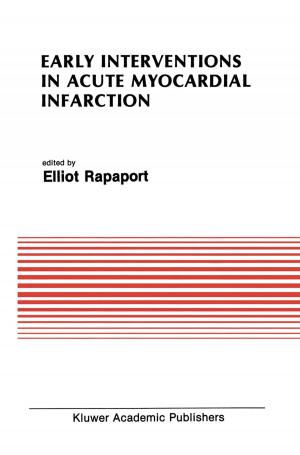Acute Coronary Care 1987
Nonfiction, Health & Well Being, Medical, Specialties, Internal Medicine, Cardiology| Author: | ISBN: | 9781461323372 | |
| Publisher: | Springer US | Publication: | December 6, 2012 |
| Imprint: | Springer | Language: | English |
| Author: | |
| ISBN: | 9781461323372 |
| Publisher: | Springer US |
| Publication: | December 6, 2012 |
| Imprint: | Springer |
| Language: | English |
During the 25 years since acute coronary care was focused into Coronary Care Units there have been three major Phases: I. prevention of death caused by arrhythmias; II. prevention of death due to myocardial failure; and III. limitation of infarct size. In the latter two Phases, there has been infringement upon the time honored concept of a prolonged period of rest for the patient in general and the heart in particular to minimize myocardial metabolic demands. During the second Phase of coronary care, patients with myocardial failure received aggressive measures to increase cardiac work via increase in preload, decrease in afterload, and direct increase in inotropy. It was believed that true cardiogenic shock was so irreversible that it should be prevented by vigorous efforts to improve the cardiac output despite the risk of extending the area of ischemic myocardium. However, Phase II produced minimal overall reduction in mortality. In the initial part of Phase III, myocardial infarct (MI) size limitation was attempted by reducing myocardial metabolic demands via either beta adrenergic or calcium channel blocking agents. We are currently several years into the second part of Phase III of coronary care where the principle means of limiting MI size is restoration of coronary blood flow.
During the 25 years since acute coronary care was focused into Coronary Care Units there have been three major Phases: I. prevention of death caused by arrhythmias; II. prevention of death due to myocardial failure; and III. limitation of infarct size. In the latter two Phases, there has been infringement upon the time honored concept of a prolonged period of rest for the patient in general and the heart in particular to minimize myocardial metabolic demands. During the second Phase of coronary care, patients with myocardial failure received aggressive measures to increase cardiac work via increase in preload, decrease in afterload, and direct increase in inotropy. It was believed that true cardiogenic shock was so irreversible that it should be prevented by vigorous efforts to improve the cardiac output despite the risk of extending the area of ischemic myocardium. However, Phase II produced minimal overall reduction in mortality. In the initial part of Phase III, myocardial infarct (MI) size limitation was attempted by reducing myocardial metabolic demands via either beta adrenergic or calcium channel blocking agents. We are currently several years into the second part of Phase III of coronary care where the principle means of limiting MI size is restoration of coronary blood flow.















